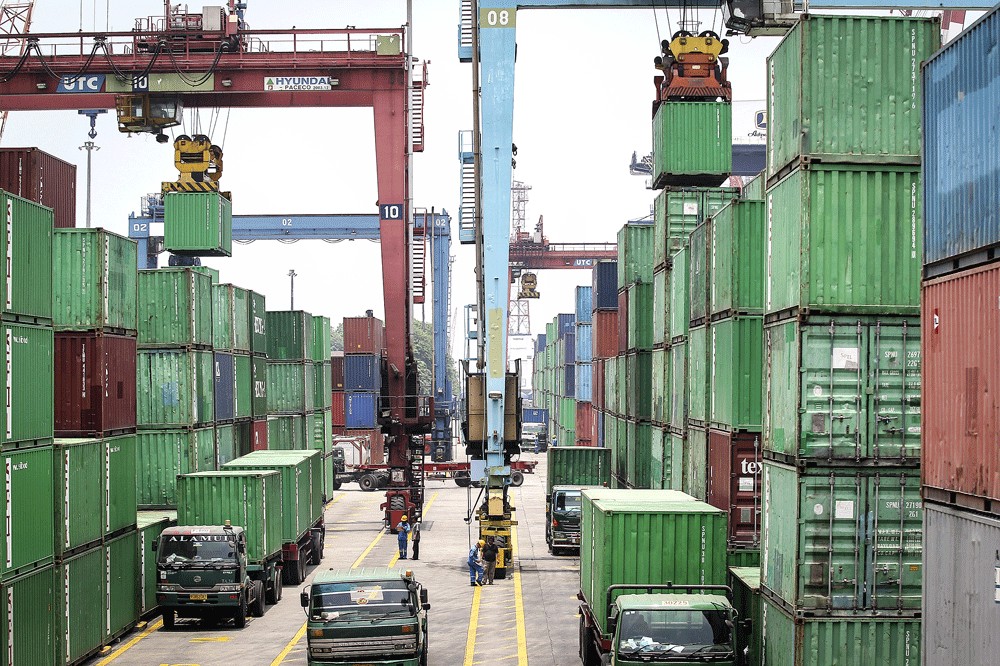Popular Reads
Top Results
Can't find what you're looking for?
View all search resultsPopular Reads
Top Results
Can't find what you're looking for?
View all search resultsRestrictive regulations on foreign trade may hurt economy
The Indonesian government database on goods tends not to be accurate, contaminated by proxies and prone to be politicized.
Change text size
Gift Premium Articles
to Anyone
T
he government has enacted 49 implementing regulations (PPs) and four presidential regulations (Perpres) for the 2020 Job Creation Law.
This article will discuss the PPs on imports and exports. After all, export-oriented investors would prefer a more efficient, outward-looking location to invest in, and with fewer trade barriers. Countries with a more open and consistent trade policy tend to grow faster, while ambivalent policies create business uncertainty and inefficiency. However, the government seems to prefer import substitution. The latest appeal for Indonesians to prefer local products added a twist to the issue.
Two PPs closely related to international trade are PP No. 28 about industry and PP No. 29 about trade. The two PPs seem to suggest a more restrictive trade regime. PP No. 28 allows the government to intervene in companies’ decisions to access imported inputs (raw materials and intermediate goods) and to export. It lists thousands of 10-digit harmonized system (HS) products defined as “intermediate inputs” that can be controlled by the government. PP No. 29 explains a more detailed mechanism on export and import approval, criteria for importers or exporters and procedures to get the licenses. Ultimately, the government believes that these PPs can help industries to access intermediate inputs.
The major change in these follow-up regulations is the introduction of Neraca Komoditas (commodity balance). The Neraca Komoditas is conceptualized as an integrated system that contains accurate and detailed information on planned domestic supply and domestic demand of industrial inputs. It is supposed to provide data on the type, quantity and quality of goods, as well as the timing of goods needed to be supplied and demanded.
The commodity balance will be updated every December by the central government to be used for controlling or managing trade in the following year. If the Neraca Komoditas says there is a gap in the domestic supply of a good, then the government can impose an export ban on that good.
Additionally, the government can also loosen import restrictions (even adding incentives) to close the gap. If the Neraca Komoditas says there is a surplus, the government can open up exports just enough to close the surplus gap.
The main feature of the Neraca Komoditas system is data. The commodity system is supposed to have complete, integrated data on production, demand, exports and imports from many related ministries. This is an important necessity since the supply and demand of inputs are controlled by different ministries. Unfortunately, the Indonesian government database on goods tends not to be accurate, contaminated by proxies and prone to be politicized.
An unreliable database can lead to uncertainties in implementation, which can be problematic for companies that can be very dynamic by nature. The daily decisions on imports, exports and production usually need careful assessment of cost, prices, quality, variety, changing demand and tastes, profitability and efficiency. This non-tariff measure could not only reduce the incentives for companies to innovate and to be more productive, but could induce rent-seeking behavior.
To add to the flexibility of the implementation, the Neraca Komoditas can be revised mid-year in a ministerial meeting. In fact, there are many things in the rules that require more ministerial meetings and follow-up regulations. A revision may take time that businesses cannot afford, and the overall implementation of the system may introduce more red tape instead of reducing it.
Sourcing the data on supply and demand from firms may mitigate some of the inconsistency of the data. However, it may create incentives for firms to lie. A supplier, knowing that the government will ban imports if there is a surplus, has an incentive to report inflated production statistics to keep foreign competition out.
On the other hand, industries that use the goods for production may inflate their needs to keep imports open to a non-binding level of constraint. This can easily turn into a game of cat and mouse as the two sides inflate their respective numbers. The fact that the rule prohibits industries from selling their unused imported inputs may mitigate this game to a degree, but causes more uncertainty for business.
For small businesses that have no ability to import their inputs, the government has prepared “basic material centers”. These centers are tasked with making bulk imports for them based on contracts. While these basic material centers may help small businesses, the concept really sounds like the problematic state logistics agency, Bulog.
At the moment, it is unclear whether these basic material centers will be a government or private entity, or how they will be financed. Hopefully the information will become clearer once the follow-up ministerial regulations regarding these centers are drafted.
Getting more inward looking is not new for Indonesia. Trade policies have been contradictory and non-effective for decades. The government has imposed various measures to reduce imports, including raising tariffs, implementing trade remedies and technical barriers. The concept of import substitution has been adopted using the local content requirement policy, and has become more popular during COVID-19 as global protectionism increases.
***
Krisna Gupta is a PhD student of economics at Crawford School of Public Policy, the Australian National University. Deasy Pane is an economist at the National Development Planning Agency. These views are personal.










